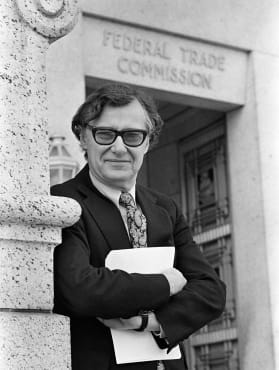While you weren't looking, the Biden administration ended involuntary servitudeThat is, if the rule survivesFriends, Have you ever been forced to sign a non-compete agreement when you started a job? Some 30 million Americans are trapped by contracts that say if they leave their current job, they can't take a job with a rival company or start a new business of their own. These clauses deprive workers of higher wages and better working conditions. In effect, they're a form of involuntary servitude. Last week, while America was fixated on Kevin McCarthy's travails, the Federal Trade Commission proposed a sweeping new rule that would ban these non-compete agreements. This is a big deal. The FTC estimates that such a ban could increase wages by nearly $300 billion a year (about $2,000 per worker, on average) by allowing workers to pursue better job opportunities. Non-competes also harm the economy as a whole, depriving growing businesses of talent and experience they need to build and expand. As historian Margaret O'Mara noted (via Matt Stoller), California's ban on non-competes was a major reason for Silicon Valley's success. The rule isn't a sure thing. The public has 60 days to offer comment on it, after which a final rule could be published and then enforced some months after that. House Republicans will try to kill it, and I expect corporate America to appeal it up to the Supreme Court. For several decades, non-compete agreements have been cropping up all over the economy — not just in high-paying fields like banking and tech but as standard boilerplate for employment contracts in many low-wage sectors such as construction, hospitality, and retail. A recent study found one in five workers without a college education subject to them, disproportionately women and people of color. (Most don't know what they're signing or aren't in a position to refuse.) Employers say they need non-compete agreements to protect trade secrets and investments they put into growing their businesses, including training workers. Rubbish. Employers in the states that already ban them (such as California) show no sign of being more reluctant to invest in their businesses or train workers. The real purpose of non-competes is to make it harder (or impossible) for workers to bargain with rival employers for better pay or working conditions. As we learn again and again, capitalism needs guardrails to survive. Unfettered greed leads to monopolies that charge high prices, suppress wages, and corrupt politics. As Adam Smith, the putative godfather of conservative economics, put it in The Wealth of Nations: "People of the same trade seldom meet together, even for merriment and diversion but the conversation ends in a conspiracy against the public, or in some contrivance to raise prices." America once understood the importance of fighting monopolies. The presidential election of 1912 was dominated by the question. Woodrow Wilson created the Federal Trade Commission to save capitalism from the depredations of powerful corporations and "robber barons" that had turned the economy of the Gilded Age into vast monopolies, fueling unprecedented inequality and political corruption. But as the FTC began prosecuting giant corporations, the robber barons saw the agency as a major threat — and did what they could to strip it of its powers. In 1976, when I ran the policy planning staff of the FTC, the agency again began cracking down on corporations under its aggressive chairman, Michael Pertschuk, who had been appointed by Jimmy Carter. (Pertschuk died just weeks ago.) Corporate capitalists were so unhappy with the FTC under Pertschuk that they tried to choke off the agency's appropriation, briefly closing it down in 1978. But Pertschuk didn't relent. He (and I) left the agency when Ronald Reagan appointed a new chairman, who promptly defanged it. Now, under its new Biden-appointed chair, Lina M. Khan, the FTC is again being the activist agency that progressives sought in 1914 and Pertschuk brought back to life in 1976. The FTC's new proposed rule banning non-compete agreements marks the first time since Pertschuk headed the FTC that the agency has issued a rule prohibiting an unfair method of competition. As the old saw goes, history never repeats itself but it does rhyme. So I wouldn't be surprised if the new radical-right Republicans now in control of the House tried to pull off a stunt similar to what the House tried in 1978. (The U.S. Chamber of Commerce calls the FTC's proposed rule "blatantly illegal.") More generally, the radical-right Supreme Court has signaled it will attack the constitutionality of independent regulatory agencies such as the FTC. So beware. In the meantime, kudos to Biden, Lina Khan (and her fellow commissioners Rebecca Kelley-Slaughter and Alvaro Bedoya), and to the FTC for protecting American workers and economic competition — and thereby protecting American capitalism from the depredations of untrammeled greed. |
Wednesday, January 11, 2023
ANS -- While you weren't looking, the Biden administration ended involuntary servitude
I got this in an email from Robert Reich. It's about another good thig that the Biden administration is trying to do, but we mostly don't hear about it. I thought you should know about this: They are trying to end non-compete agreements. For an explanation, read the missive.
--Kim
Subscribe to:
Post Comments (Atom)





No comments:
Post a Comment